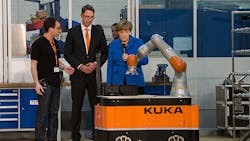Chinese Midea Begins Takeover Bid for German Kuka
BEIJING — Chinese appliance firm Midea announced on Thursday that it has begun a cash offer for at least a 30% stake of German industrial robotics supplier Kuka, a tender that has stoked controversy in Europe.
Midea, best known for selling washing machines and air conditioners, offered 115 euros ($129.90) per share for Kuka, one of the world’s leading manufacturers of industrial robots, in the voluntary takeover offer. The deal would make Midea the biggest shareholder in Kuka, a possibility that has raised concerns in Europe about the transfer of high-end technology to China — an issue that cast a shadow over a visit to the country this week by German Chancellor Angela Merkel.
China has made easy money available to companies, pushing them to invest in foreign targets to increase their know-how and improve their balance sheets as economic growth slows at home. A growing list of German companies, such as Kion, Putzmeister and KraussMaffei have come under Chinese ownership in recent years.
The ruling Communist party has been encouraging the country’s manufacturers to use more robots to make production more efficient as labor costs rise. The world’s second-largest economy is already the leading market for industrial robots, accounting for a quarter of global sales, according to the International Federation of Robotics.
Kuka shares closed at just over 106 euros ($119.74) in Frankfurt trading on Wednesday. They have gained about 26% since the deal was first proposed in May, according to Bloomberg News. Midea stock was suspended from trading mid-day Thursday. The company said its offer ends July 15, with no ceiling on the percentage of shares it could buy.
Midea said when it launched the deal that it did not intend to end up in a position of “domination” over the German company.
Kuka, based in Augsburg, describes itself as one of the world’s leading manufacturers of industrial robots and also offers automated systems for manufacturing.
European media reported that officials in Brussels and Berlin oppose a Chinese takeover bid of Kuka, allegations denied by Berlin. Merkel, meanwhile, told reporters in Beijing this week: “We are looking into a solution which can satisfy both sides.”
Midea’s global turnover was more than $22 billion last year, according to its website.
Analysts said the investment could give the firm, based in the southern province of Guangdong, technological know-how in an area with growth potential in China while expanding Kuka’s customers in the world’s workshop.
“As a traditional producer of durable consumer goods, Midea’s domestic market is almost saturated,” Huang Fusheng, an analyst at China Securities, told AFP last month. The company “needs to expand industries and transform, so this (investment) is a necessity.”
Copyright Agence France-Presse, 2016
About the Author
Agence France-Presse
Copyright Agence France-Presse, 2002-2025. AFP text, photos, graphics and logos shall not be reproduced, published, broadcast, rewritten for broadcast or publication or redistributed directly or indirectly in any medium. AFP shall not be held liable for any delays, inaccuracies, errors or omissions in any AFP content, or for any actions taken in consequence.
